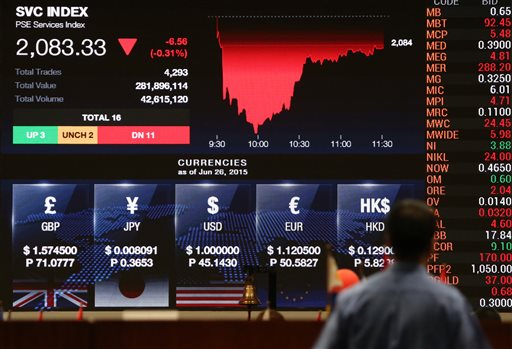Greek debt crisis being felt in Manila

A Filipino trader walks in front of an electronic board showing a downward trend in trading at the Philippine Stock Exchange in the financial district of Makati, south of Manila, Philippines, Monday, June 29, 2015. As Greece teeters closer to debt default and possibly exit from the European Union, tremors are being felt in Philippine financial markets. AP
As Greece teeters closer to debt default and possibly exit from the European Union, tremors are being felt in Philippine financial markets.
For weeks now, the Greek debt crisis has curbed whatever little incentive is left for foreign investors to gobble up local equities, where bargains are anyway hard to find these days.
On the eve of the June 30 deadline for Greece to strike a bailout package with creditors to avoid defaulting on debts to the International Monetary Fund (IMF), the Philippine Stock Exchange (PSE) lost 54.67 points, or 0.72 percent, to close at 7,567.38.
The peso shed 10.50 centavos to close at 45.190 against the US dollar from Friday’s close of 45.085.
Governor Amando M. Tetangco Jr. of the Bangko Sentral ng Pilipinas (BSP) said the “developments in Greece may cause volatility in financial markets, as some participants shy away from positions until there is clearer direction on the next steps in the European Union.”
PH to weather storm
But the Philippines should be able to weather the crisis using the same buffers that insulated the domestic economy from past spells in recent years, Tetangco said.
“Asian emerging market economies may be affected… but there is fundamental robustness in domestic economies, including in the Philippines, that should help shield us from any fallout,” the BSP chief said in a text message to the Inquirer.
The Philippines boasts of high levels of dollar reserves and Southeast Asia’s most cash-rich banking system. Despite a slowdown in the first quarter, the Philippine economy also remains one of the best-performing in the region.
On Monday, Greece announced it would implement capital controls to protect its banking sector, which was deprived of additional emergency financing by European Union creditors and the IMF.
Athens said it would restrict bank withdrawals in the coming days to prevent a collapse of cash-strapped Greek banks.
“The Greek situation is clearly unsettling the eurozone market and is spilling over because of the psychological and negative signaling effects,” PSE president Hans Sicat said in a text message.
“In theory, it should be contained given that the Greek economy and the liabilities are small compared to [the] euro group. So it will be a question [of] how Asia believes the situation will or will not create [a] contagion,” Sicat added.
No direct impact
Jose Mari Lacson, head of research at local stock brokerage Campos Lanuza & Co., said “[t]echnically, there should be no direct economic impact on the Philippines as our trade with Greece is insignificant.”
But because the problem is IMF-related, Lacson said the impact on the global financial markets could be substantial, which he said could drag down the peso toward the 46:$1 level.
The weak sentiment, Lacson said, could result in an increase in spreads on credit default swap (CDS)—referring to an insurance-like protection to bondholders—which will make it more expensive for local corporations to secure capital.
“Companies that are trying to roll over some of their debt may postpone from doing so and those that are riding on short-term financing may face higher borrowing costs soon,” he said.
Lacson said heightened jitters from the Greek crisis could accelerate share sale and exit by foreign funds from the Philippines.
Foreigners net sellers
In recent weeks, foreign funds have been net sellers at the local market.
“Following this train of thought, we think that it would be best to hold on to export-related stocks and possibly gold-related stocks in the meantime because funds that are exiting will be looking for safe havens that are (relatively) reasonably priced like gold,” he said.
Eusebio Tanco, president of Venture Securities, said a prospective Greek exit from the European Union could result in more foreign fund outflows.
With Greece potentially out of the eurozone, he said the Philippines would face stiffer competition attracting foreign funds because the eurozone could henceforth attract more interest.
“It will be a stronger euro. I think Greece is a baggage to them,” he said.
Risk aversion trades are causing the US dollar to strengthen, said Banco de Oro Unibank chief strategist Jonathan Ravelas, noting the consequent “flight to quality.”
“Should a Grexit (Greece exit) occur, expect a knee-jerk reaction in favor of the dollar,” Ravelas said, projecting that the peso could weaken to 45.30 from 45.50.
BSP intervention
Security Bank economist Patrick Ella said the BSP could opt to promote calm in the foreign exchange markets through intervention to keep the peso stable.
While the BSP allows the peso to move according to market forces, officials leave room for occasional buying and selling to ensure the currency’s fundamental value is maintained.
Beyond intervening in foreign exchange markets, the BSP is expected to stay its hand, Ella said.
“[The] bulk of the impact would be volatility in financial markets,” Ella said, adding that turmoil in Greece was just one of the many risks that would weigh on policymakers’ minds.
For instance, a full economic recovery in the United States remains uncertain, while China’s manufacturing sector, which local exporters feed into, faces a contraction.
Europe’s troubles could still be contained. Most of Europe has recovered from the worst of its debt woes, Ella said.
Greece has also been ring-fenced by the rest of the continent, ensuring that a default by Greek banks does not cause a credit crunch elsewhere in the region.
RELATED STORIES
Asia markets hit by Greece fears, Shanghai plunges














